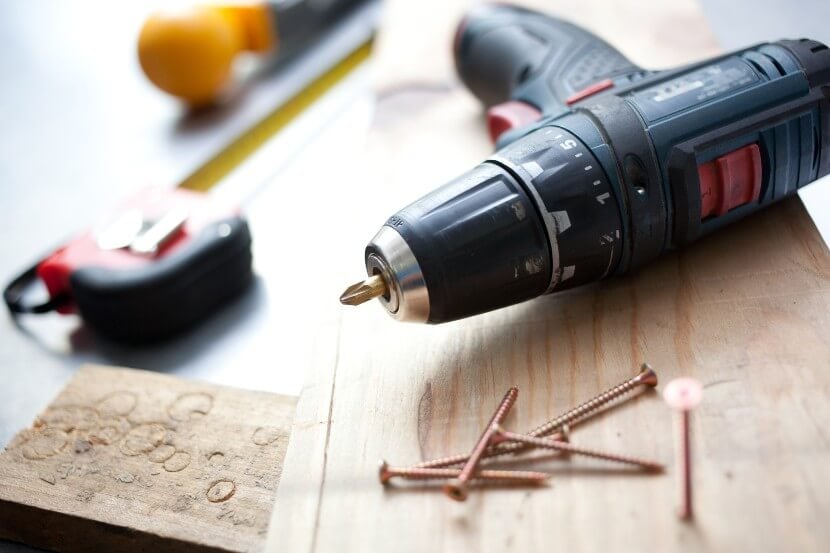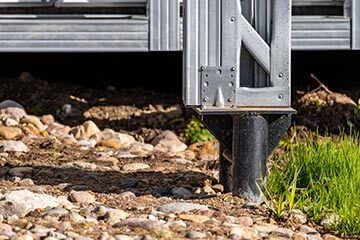Seen a TikTok on cottagecore and want to give it a go? If you're making cosmetic changes to your home, you probably don't need to tell your insurer.
You do need to tell your insurer if you’re doing any work that alters the structure of your home or garden. For example, extensions, outdoor decking or loft conversions. This is because it could affect your home’s value.
Here are the jobs you'll likely need to tell your insurer about.

What jobs do I need to tell my insurer about?
Putting up a shelf? Your insurer doesn't need to know about this kind of work. But there are bigger projects and renovations you'll need tell your insurer about, including:
- Extending a room
- Adding a conservatory
- Doing a loft conversion
- Replacing a roof
- Installing double-glazing
- Adding a porch
- Adding a summerhouse
- Adding a pool
Why do I need to tell my insurer about building work that changes my home’s structure?
Changing your home's structure affects its value. So, your insurer might need to re-evaluate your insurance cover, which could mean higher home insurance costs.
Not telling your insurer about major building work is a big no-no and could invalidate your cover. That's because your home is more vulnerable to damage if you’re having building work done.
If you're having major work done, lots of people could be coming and going from your home. Plus, it could be easier to access if you've got a wall down, for example.
You’ll probably have to move out temporarily too, which leaves your home vulnerable to criminals.
Don't be alarmed. If you tell your insurer, they can adjust your policy and potentially cover some of these risks.
You might have to pay an admin fee for the pleasure, this covers the changes they need to make to the policy.
If there’s building work going on while you’re getting a home insurance quote
When you get a home insurance quote with us, we’ll ask you whether you agree or disagree with the following statement “there is no building work in progress”.
When you select an insurer they might ask more questions about the building work you’re having done. This could affect your insurance price or your ability to get a quote.
Compare home insurance quotes
Are accidents relating to DIY covered on a standard home insurance policy?
No, a standard home insurance policy doesn't cover you if something goes wrong with a DIY project. By DIY, we mean cosmetic jobs like putting up shelves or changing your carpet.
To cover this, you need an accidental damage add-on. You can add this to your buildings and contents insurance policy. This covers damage to permanent fixtures or fittings like your windows or walls.
It can also cover any structural damage to your home due to an accident, for example, damage to your walls or ceiling.
Genuine mishaps, such as putting your foot through the ceiling or bursting a water pipe while putting up a picture, can happen to the best of us. Instances like these should be covered under an accidental damage policy.
You’re also covered under your home emergency cover policy, if you have this. But this type of cover only covers the cost of calling out the tradesperson to fix the issue, not the damage. You can use your buildings or contents insurance for this or pay for the repairs yourself.
However, accidental damage policies have some limits. The main one is if you cause damage while doing a job you’re not qualified to do.
Unfortunately, watching 10 YouTube tutorials on unblocking a drain doesn’t make any of us a plumber. You should hire a tradesperson with liability insurance to help you with the job if you don’t think you can do it.
If you’re looking to buy a new home insurance policy, always check the levels of cover on offer, especially if you’re about to take on a new DIY project.
If you have a policy you’re happy with, contact your insurer to check what you’re covered for. If you don’t have accidental damage, you might be able to pay a little extra to have this added to the policy.
This could be a lot cheaper than having to pay for repairs yourself if something goes wrong.
Other ways to protect my home during DIY/building work
You can protect yourself and your home during building work by:
- Buying contents insurance. It doesn't protect your building, but it does protect your personal possessions. For example, if they’re damaged or go missing during building work.
- Adding legal protection if you plan on making big structural changes. This can help with any legal disputes that might come up. For example, if your neighbours contest the building work, even if you made them aware of it. Legal protection covers the costs if you end up getting into civil disputes that need to be settled in court.
- Ensuring your builder has liability insurance. This is important as it can cover any resulting damages, including any damage to your neighbours' properties.
What jobs don’t I need to let my insurer know about?
You don’t need to let your insurer know about any basic home DIY jobs that are considered cosmetic. This includes:
- Replacing your carpets
- Putting up shelves
- Re-tiling a bathroom
- Wallpapering
- Painting
- Anything cosmetic in the garden, such as paving, general gardening and even putting up a shed.
If you’re installing a security system or better locks, it’s worth letting your insurer know. As it’s increasing your home’s security, your risk level is lower and you could see cheaper insurance costs.
Do I need to tell my insurer about my garden renovation?
You should always tell your insurer about any major garden renovation plans you have, for example, building outbuildings or garden pods.
This is especially true if you think the work you're doing is going to affect the value of your home. It might also be the case if a team of people are needed to work on a project.
Do I need to tell my insurer about garden landscaping?
In some cases, yes. The funny thing about garden landscaping is that you might engage in it without realising.
There are all sorts of definitions of landscaping, but let's start on the basis that it's slightly more extensive than planting the odd flower. You'd need to tell your insurer if you're doing these sorts of landscaping projects:
- Installing features such as paving or decking
- Raising or lowering sections of the garden
- Erecting sheds, outhouses, large storage units or pergolas
- Replacing or removing grass or turf
Projects involving changes to structures are likely to fall under a buildings insurance policy. So, if you are planning on building an area of decking or bringing your dream outhouse to life, it's always best to inform your insurer first.
At this point, it's important to state that your garden renovation isn't always covered by a home insurance policy. This is particularly true if you attempt to take on a big project yourself, and it goes pear-shaped.
Why wouldn't you be covered? Well, whether you're qualified to complete a major garden project does play a role here.
Let's say, for example, you attempt to create a decking area in your garden. If you have no prior experience in doing so, and it collapses, causing significant damage to your garden, if you claim, it could be rejected.
Even if you have accidental damage cover, it might not afford you financial protection if the work carried out is shoddy and you need to claim.
Can I get garden insurance?
Good news, if you have buildings and or contents insurance, you'll already have a degree of cover for your garden! It's unlikely you'll be able to find a standalone garden insurance policy as cover is usually included with home insurance.
What's covered depends on your policy, you should find exclusions and cover amounts in your policy documents.
That said, you can speak to your insurance provider to ensure you have the right amount of cover in place for what you need.
Does contents insurance cover my garden furniture?
Typically yes. If you have a contents policy in place for your home, it should cover your garden furniture, like chairs and tables. It should cover other items that you keep in your garden too, including:
- Lawnmowers, strimmers, and other items kept in a storage unit or shed
- Barbeques and patio heaters
- Plant pots, trees and bushes, etc.
- Children's play equipment, such as slides and trampolines
As always, each policy is different, so exactly what is and isn't covered should be outlined in your policy. If you can't find it in your insurance documents, speak to your insurer to get a full picture.
There are some conditions. For example, some insurers ask you to keep certain items locked away at night.
Typically, a contents home insurance policy will tend to outline a single item limit. This means that high-value items are only covered up to a limit stated in your policy.
Let's say you buy a large garden table for £2,000. If your home insurance contents policy states a single item limit of £1,500, you won't be covered for the £500 difference if you claim. You should have the option of insuring high-value items exceeding the limit separately from your policy, likely at an additional cost.
Can I claim for garden fences and storm damage on home insurance?
Fences don't tend to fare well in storms and high winds, it goes without saying. Because of this, fences aren't typically covered in the event of storm damage.
It really does depend on your policy, some insurers do offer cover for storm damage, but with stated conditions.
What conditions are we talking about? Firstly, your insurance provider is likely to question the condition of the affected fence(s) prior to storm damage. Wear and tear is a common exclusion, so in order to progress any claim, you'll need to prove your fence was in good condition prior to damage.
In addition, you might find your insurer raises the definition of a storm. Some providers judge wind speeds and level of rainfall to qualify any potential claims. It sounds trivial, but these details can come into question.







